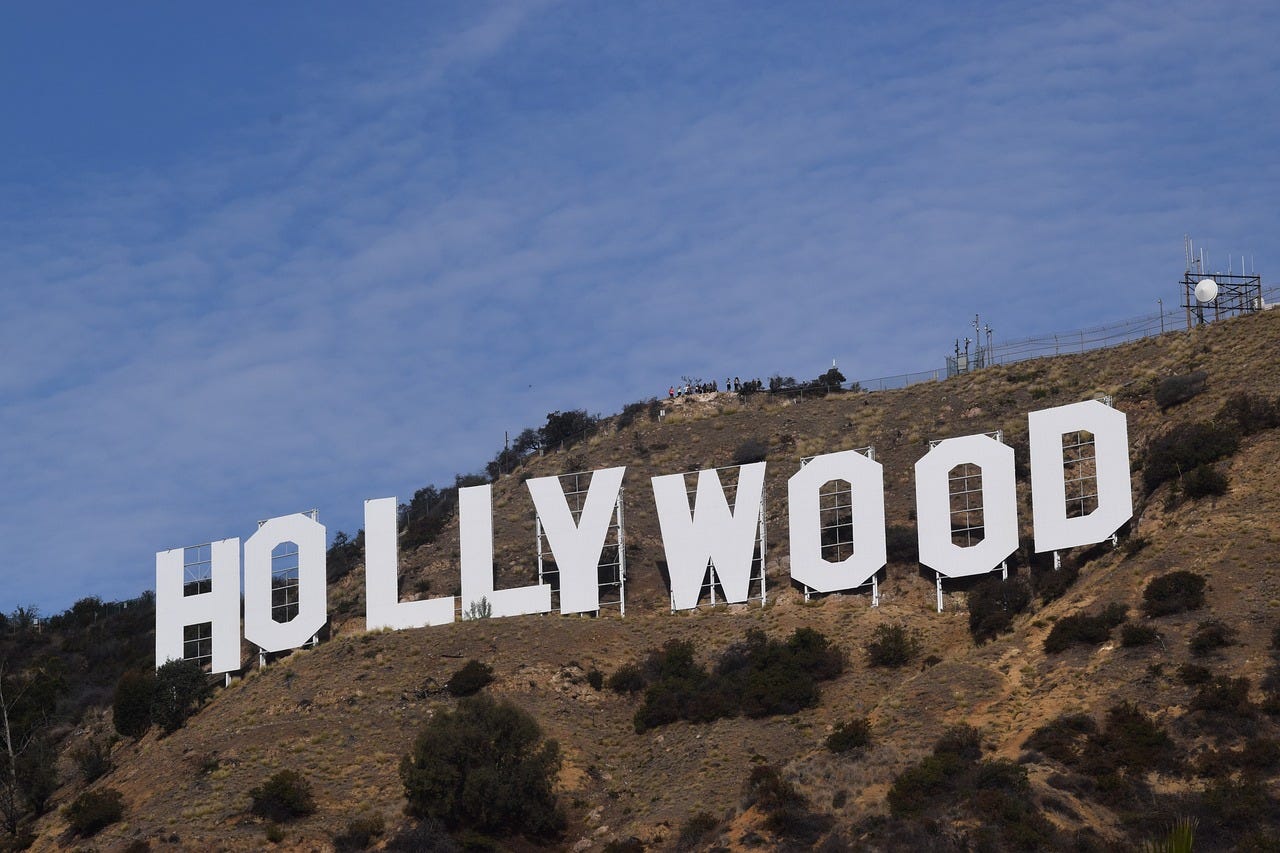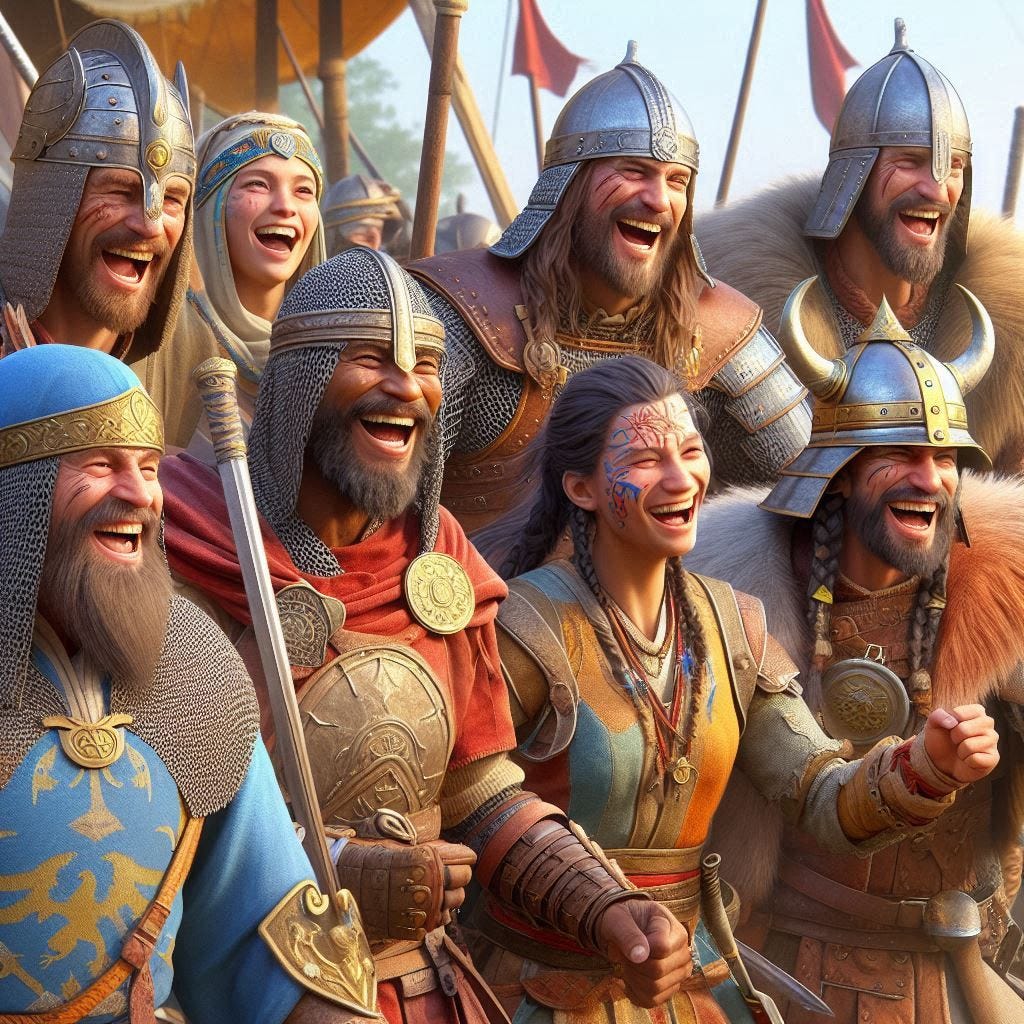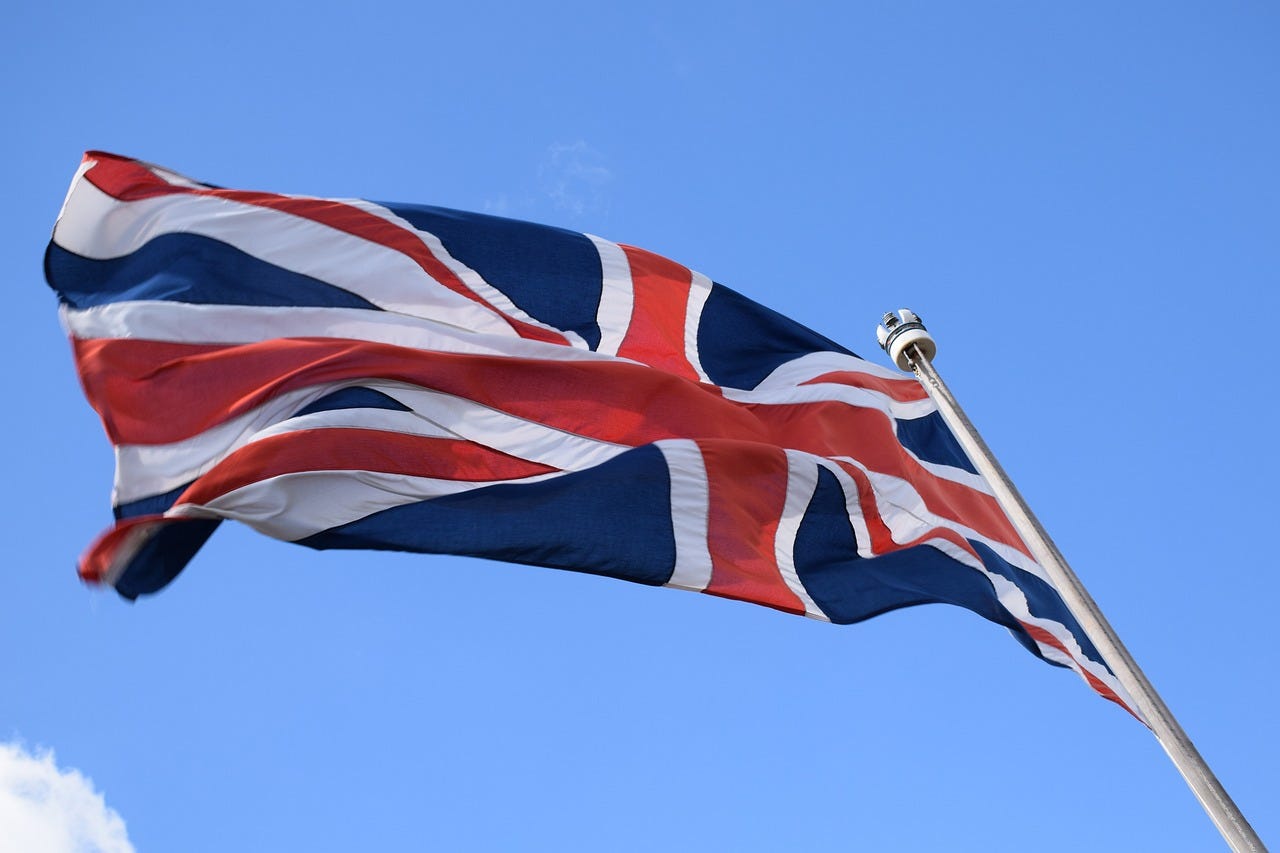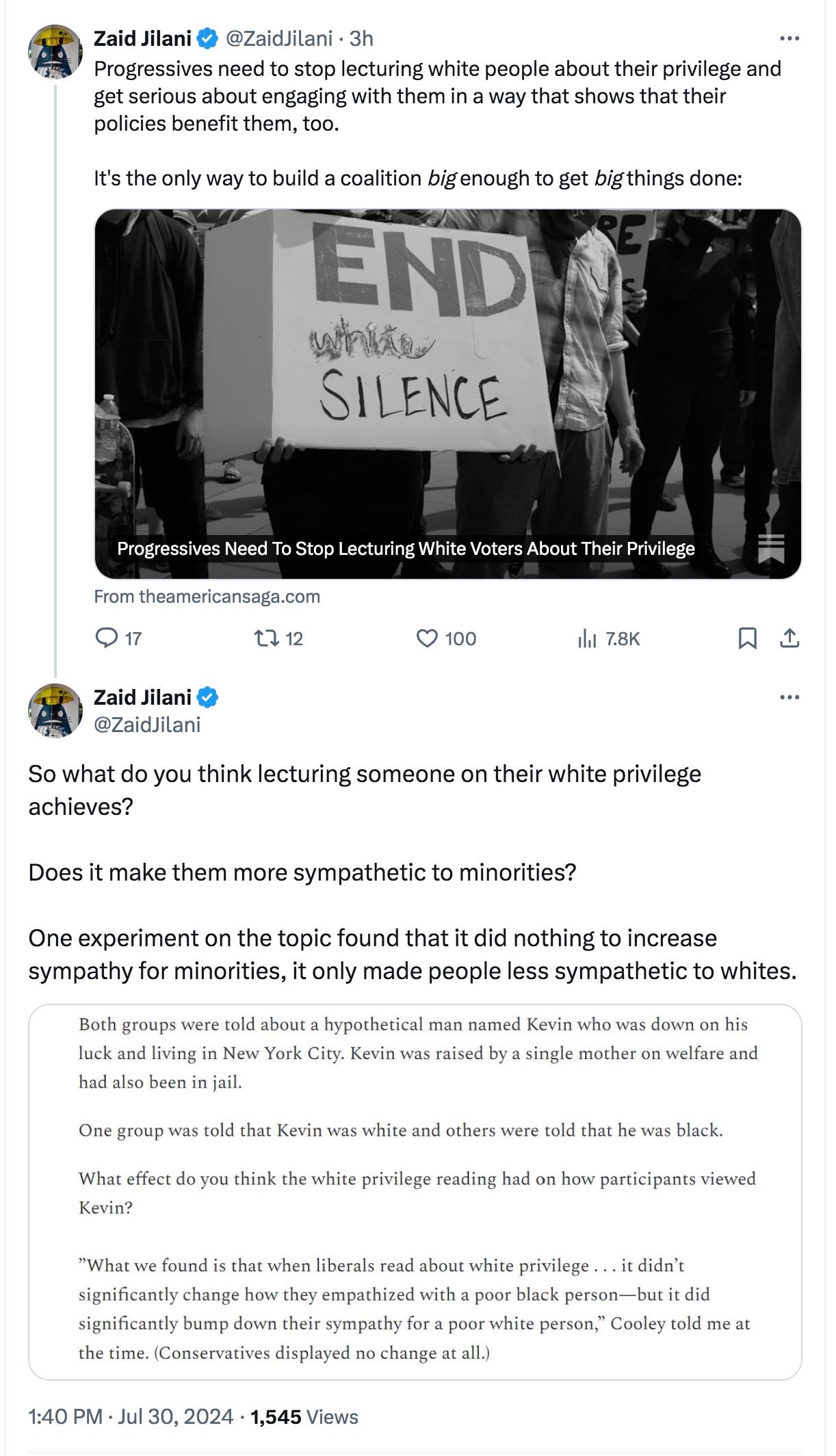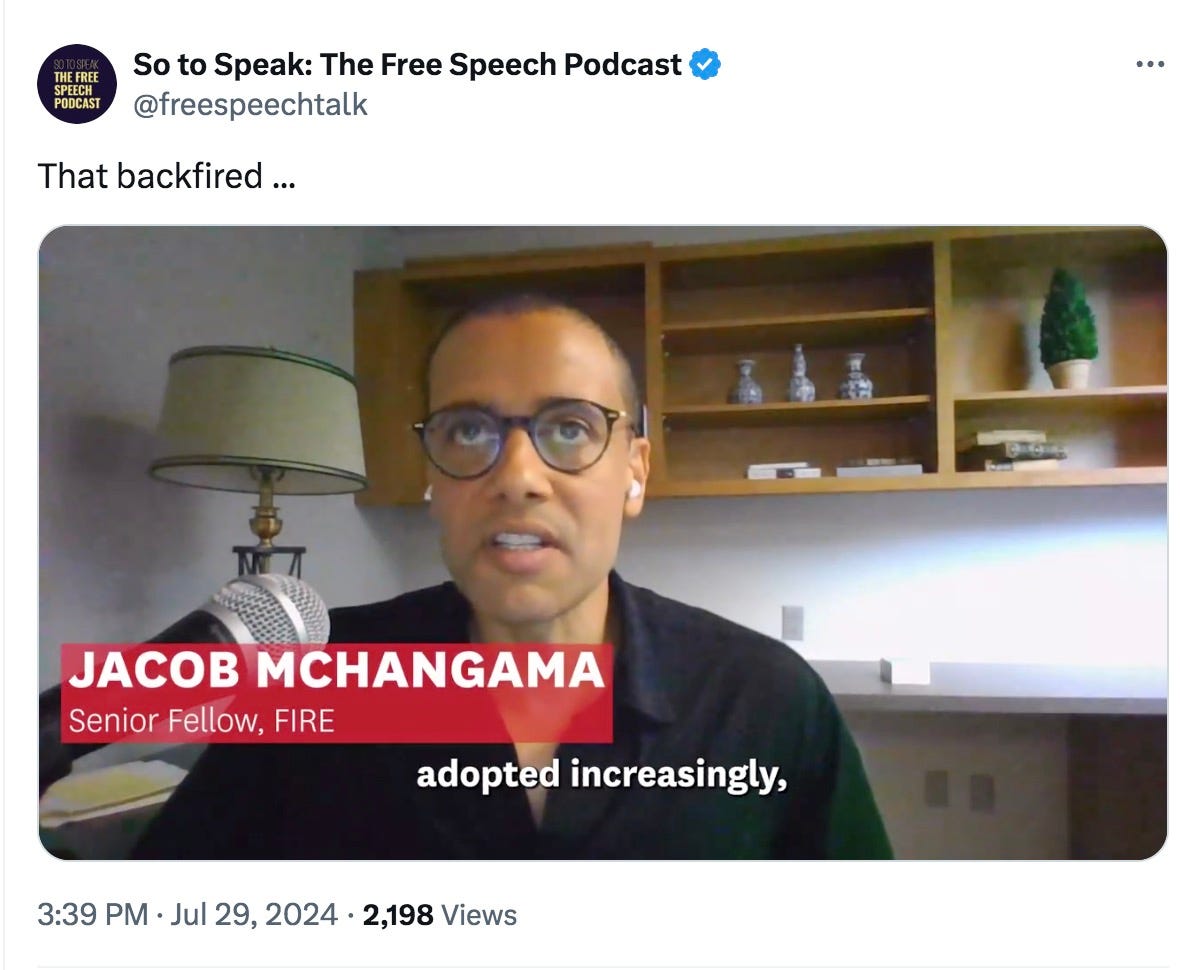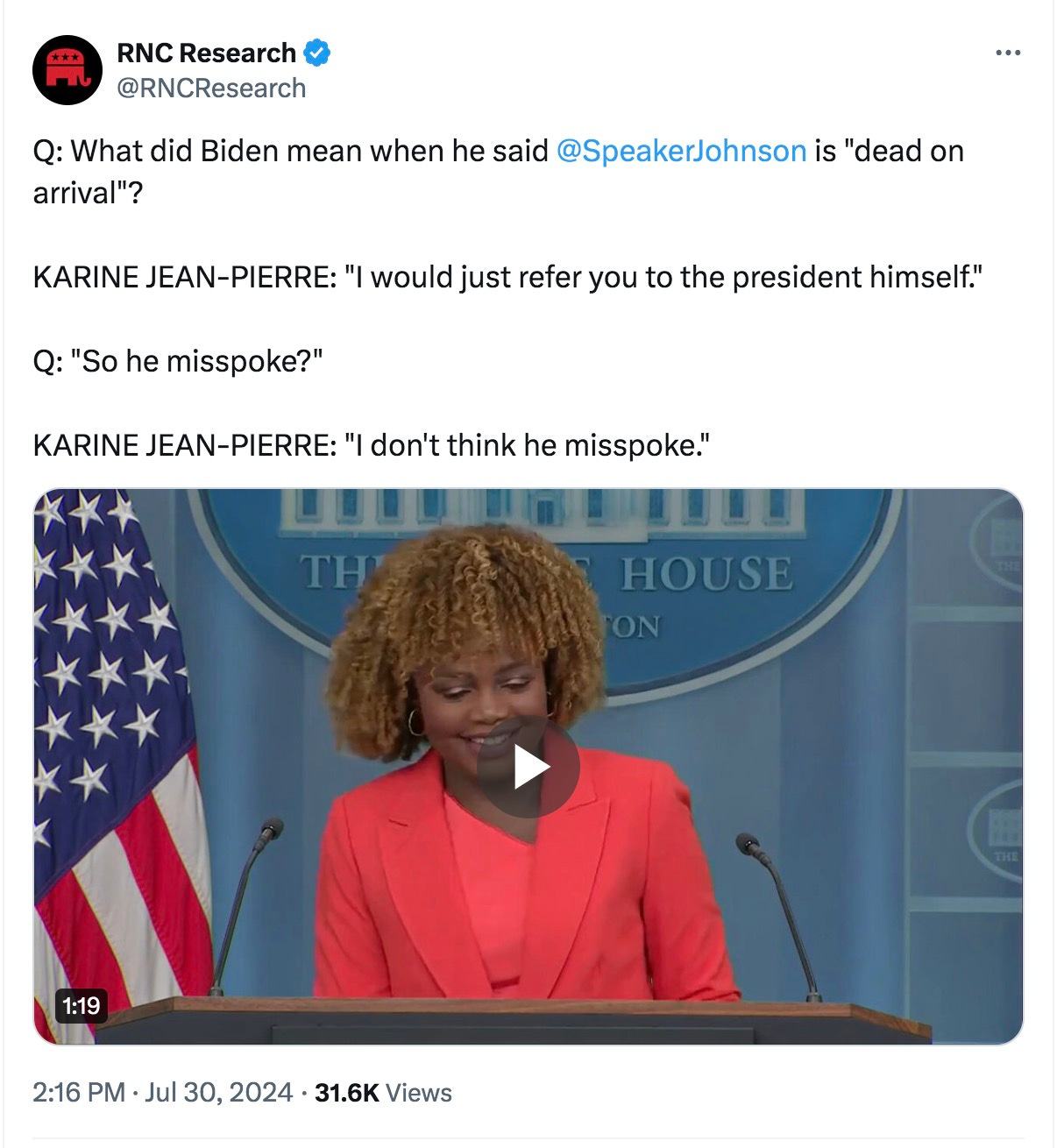E-Pluribus | July 30, 2024
Say goodbye to Hollywood (or at least its true history); don't lose hope in democracy; and censorship makes a comeback in Britain.
A round-up of the latest and best musings on the rise of illiberalism in the public discourse:
Libertas Conscientiae [pseudonym]: Hollywood Faces the DEI Cliff
Hollywood has always been about make believe, and presently the Academy of Motion Picture Arts and Sciences and others in the industry are pretending they don’t have a diversity, equity and inclusion problem. An anonymous Hollywood veteran writing for Foundation Against Intolerance & Racism gives an insider’s look at how DEI is impacting his industry.
The Academy’s [Academy of Motion Picture Arts and Sciences] current woes center around the flagship Academy Museum which should have been a public relations lay-up when it opened in the Fall of 2021. Anti-Defamation League CEO Jonathan Greenblatt, who attended the opening, was blunt in his assessment: “As I walked through, I literally turned to the person I was there with and said to him, ‘Where are the Jews?’”
What many expected to be a self-celebratory movie history museum was instead unveiled as a self-abasing propaganda outpost, deliberately designed to diminish the Jewish immigrants who created Hollywood. Guided by the “Inclusion Advisory Committee,” insiders like Senior Director of Curatorial Affairs Doris Berger conceded that rewriting history was precisely the point: “We opted not to tell a chronological history… Our goal is to tell complex stories and question film history – so much of which has been forgotten and underrepresented. We are questioning a canon and creating a canon.”
In other words, erase actual Hollywood history and replace it with a fabrication.
[. . .]
The Academy doesn’t discuss the composition of its “Inclusion Advisory Committee,” but Disney puts the Stories Matter Advisory Council front and center. Among the organizations comprising the 11-member council are the GLAAD Media Institute, Geena Davis Institute on Gender in Media, African American Film Critics Association and disability representation watchdog RespectAbility. Had any of them shown as much interest in helping Disney navigate the treacherous waters of the culture’s collapsing Diversity, Equity and Inclusion regime as they did in advocating for the on-screen representation of their various constituencies, the company’s troubles might have been forestalled.
Increasingly, it's journalists and artists of color, like Film Threat’s Alan Ng, who are blowing the whistle. Writing for the New York Times Magazine this past March, Kabir Chibber took the industry to task for fabricating a “magical, colorblind past” in movies and series like Netflix’s Bridgerton, which he argues only end up erasing the histories we most need to learn and learn from. Last June it was Oscar-winning New Zealand-born filmmaker Taika Waititi venting about corporate DEI initiatives at companies like Disney. “We have to include a person from every single race, and every single background, and every single part of the human experience in every show or everything that we make. That’s not reality, and it's not authentic.”
It’s easy to become cynical about the corporate nature of such DEI programs while failing to appreciate the personal conundrum they impose on executives like Disney’s Bob Iger, who is Jewish, and Academy CEO Bill Kramer, who is gay and Jewish. Beyond their professional responsibilities, these are also human beings with natural affinities which fuel a desire to do right by the communities of which they consider themselves a part. In a recent interview with Variety, Kramer was asked whether the Oscars might follow such organizations as the Spirit Awards and the Gotham Awards by making acting categories gender-neutral, a move favored by many on the progressive left as being more “inclusive” of "non-binary gender identities.” Kramer’s attempt at a diplomatic answer only made matters worse. “We are exploring this topic with our awards, membership, equity, and inclusion committees and soon with our Board of Governors,” he said. "It’s in the early exploration stage and one of many conversations about the future of awards and the Oscars. We are still investigating how it could look.”
Read it all.
Joe Romance: Democracy’s Happy Warriors
Pessimism is hard to avoid these days, politically and otherwise, but the aptly named Joe Romance writing at Discourse Magazine says there remain reasons for optimism, but more optimists are needed. Romance argues that our current problems, though serious, are certainly no worse than we’ve endured before, and that America came out of our prior struggles stronger and can do so again.
The current political era seems to be one of continual crisis and fear. Not only do we live in a highly polarized country, with red and blue on opposite sides of a war, but it appears that each side believes we are at a crucial moment in our history. If their side does not win, they maintain, the American republic will falter and fail in a fundamental, possibly irreversible way. If the other side wins, the U.S. will change in ways that go against its most basic ideals.
Not surprisingly, the overwhelming public response to this possibility from those plugged into the political world is one of anguish and pessimism. I suppose that is to be expected: Certainly, the idea that the American system is standing on the precipice of collapse if we don’t vote the right way is a sobering thought.
To be sure, pessimists’ concerns seem very real. The vast majority of Americans worry about the state of democracy in this country, and that crisis of confidence is obviously a major problem as we contemplate our future. The last few weeks of political upheaval—which saw an attempt on the life of one presidential candidate and the exit of another from the race—aren’t likely to assuage Americans’ concerns about the future of American democracy.
I wonder, however, if we are in danger of too easily giving in to despair.
[. . .]
I honestly believe that our republic is far healthier than many would have us believe. The U.S. has endured through serious crises before (in fact, more serious ones—the Civil War, for sure). We have come through before, and we have the resources—physical, intellectual and spiritual—to get through these times. I am, to put it succinctly, a cautious optimist about what is happening in America.
[. . .]
To get a sense of how to think like an optimist about America, the first step is to get a better appreciation of what it means to live in a liberal democracy. Many have lost faith in liberal democracy. This lack of faith has occurred both among intellectuals and with many common voters. The most prevalent writing against liberal democracy has come from the political right—Patrick Deneen’s “Regime Change,” Yoram Hazony’s “Conservatism: A Rediscovery” and the subversively popular “Bronze Age Mindset” all are sustained attacks on the liberal ideal. And, there has been, for decades, a disturbing robust attack on democracy from the far left. Right now, on both the left and the right, liberal democracy is under siege. Yet I believe it is our greatest resource and the pride of the nation.
[. . .]
[M]uch of citizens’ lives are devoted to nonpolitical things. Liberal democracy does not presume, as Aristotle did, that man is a political animal. Indeed, liberal democracy is predicated on freeing citizens from the burden of politics much of the time. But it does require of its citizens a level of commitment, and it fosters a sense that one is still expected to be political at points in one’s life. We are free of politics, most of the time. But we need to recognize even that freedom from politics might, in some generations, call for a reengagement with the political world. There is a sense, then, that FDR was right to say that some generations have a rendezvous with destiny.
[L]iberal democracies do create a problem. They can lead to passive citizens. At best, many citizens’ devotion to the country may atrophy. At worst, a citizen may feel alienated, even disenfranchised in practice, if not in theory. But if democracy is to survive, that belief that citizenship is still a role—an office, if you will—must always be present in the citizen. Or, since passivity is now upon us in a big way, that civic spirit must be reawakened.
Read it all.
Andrew Doyle: Labour’s war on free speech
At Unherd, Andrew Doyle reports on trouble on the horizon for free speech in Great Britain. The new government is wasting no time rolling back some of the Conservative advances of recent years, and Doyle writes that higher education is one of the first items on the list.
On Friday, the new [U.K.] Education Secretary Bridget Phillipson notified Parliament of her intention “to stop further commencement” of the [Higher Education (Freedom of Speech) Act] and “to consider options, including its repeal”. Few further details are provided, other than her awareness of “concerns that the Act would be burdensome on providers and on the OfS [Office for Students]”. Upholding campus free speech, it seems, is just too much of a hassle.
During the dying days of the Conservative regime, many of us feared that this new Labour government would use its new powers to continue waging its culture war, and this is not the first red flag. Phillipson had already announced her intention to compel free schools and academies to teach the national curriculum, and that it will be rewritten under the guidance of Professor Becky Francis, an academic whose publication history has a clear activist bent. While head of UCL’s Institute of Education, she launched the Centre for Sociology of Education and Equity, which prioritises “equity and social justice” in schools. The emphasis on “equity” rather than equality is telling: it is a keystone of intersectional ideology, meaning that equality of outcome is sought over equality of opportunity.
In light of this, it makes sense that the next step would be to ensure that dissenting views continue to be stifled in higher education. After all, the introduction of the Higher Education Act was a much-needed attempt to make sure that universities uphold freedom of speech and plurality of opinion. It requires universities to guarantee academics the freedom “to question and test received wisdom” and “to put forward controversial or unpopular opinions” without risk to their livelihoods or future job prospects. It protects visiting speakers from being disinvited for controversial views. And it demands that governing bodies formulate a Code of Practice which upholds these responsibilities, and that these are annually brought to the attention of all students. The intended effect, suffice it to say, is to cultivate a more intellectually open climate by promoting academic freedom and the importance of free speech within the law.
In a sense, it is disappointing that such ideas require legislation at all. Partly this is due to an activist contingent within academic circles that has become adept at intimidating colleagues into silence. The result has been the development of a new monoculture in higher education in which self-censorship is rife. A 2020 report, for instance, found that one in three Right-leaning scholars censor themselves “for fear of consequences to [their] career”. A further study in 2022 found that three in four conservative academics occasionally self-censored while at work.
But censorship isn’t binary, and Left-wing academics are also increasingly at risk, notably those who are sceptical about activists’ demands that the highly contested belief in “gender identity” ought to supersede biological sex in matters of public policy. As far back as 2011, Julie Bindel was officially “No Platformed” by the National Union of Students (NUS), when delegates at the LGBT conference passed a motion called “This conference believes Julie Bindle is vile”. They couldn’t even be bothered to spell her name correctly. In the decade to come, she would be joined on the list of undesirables by a number of leading feminist thinkers: Linda Bellos, Selina Todd, Kathleen Stock and Jo Phoenix, to name a few.
Read the whole thing.
Around Twitter (X)
In the wake of White Dudes for Kamala, etc., etc., Zaid Jilani has this to say to progressives:
Here’s Jacob Mchangama on how censorship in the 1920s and 1930s Germany went so wrong (click for video.)
And finally, apparently the White House’s days of explaining that the public didn’t see what it saw or hear what it heard are not over yet (click for video.)




